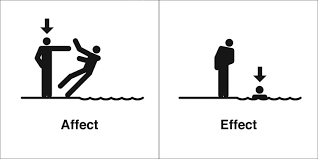记忆方法
1. 在你旁边做事件的人.
中文词源
affect 感染,打动,假装
前缀af-同ad-, 去,往。词根fect, 同fact, 做。该词根衍生出两个截然相反的意思:1. 做出来的样子,假装。2. 真心实意的做,打动,影响。
英语词源
- affect
-
affect: There are two distinct verbs affect in English: ‘simulate insincerely’ [15] and ‘have an effect on’ [17]; but both come ultimately from the same source, Latin afficere. Of compound origin, from the prefix ad- ‘to’ and facere ‘do’, this had a wide range of meanings. One set, in reflexive use, was ‘apply oneself to something’, and a new verb, affectāre, was formed from its past participle affectus, meaning ‘aspire or pretend to have’.
Either directly or via French affecter, this was borrowed into English, and is now most commonly encountered in the past participle adjective affected and the derived noun affectation. Another meaning of afficere was ‘influence’, and this first entered English in the 13th century by way of its derived noun affectiō, meaning ‘a particular, usually unfavourable disposition’ – hence affection.
The verb itself was a much later borrowing, again either through French or directly from the Latin past participle affectus.
=> fact - affect (n.)
- late 14c., "mental state," from Latin noun use of affectus "furnished, supplied, endowed," figuratively "disposed, constituted, inclined," past participle of afficere "to do; treat, use, manage, handle; act on; have influence on, do something to," a verb of broad meaning, from ad- "to" (see ad-) + facere (past participle factus) "to make, do" (see factitious). Perhaps obsolete except in psychology. Related: Affects.
- affect (v.2)
- "to make a pretense of," 1660s, earlier "to assume the character of (someone)," 1590s; originally in English "to aim at, aspire to, desire" (early 15c.), from Middle French affecter (15c.), from Latin affectare "to strive after, aim at," frequentative of afficere (past participle affectus) "to do something to, act on" (see affect (n.)). Related: Affected; affecting.
- affect (v.1)
- "to make an impression on," 1630s; earlier "to attack" (c. 1600), "act upon, infect" (early 15c.), from affect (n.). Related: Affected; affecting.
权威例句
- 1. Poor housing and family stress can affect both physical and mental health.
- 住房条件差、家庭压力大会影响身心两方面的健康。
- 2. Scientists call this the "it won't affect me" syndrome.
- 科学家把这种现象称为“我无所谓”的典型表现。
- 3. Price changes must not adversely affect the living standards of the people.
- 物价变化一定不能给人们的生活水准带来负面影响。
- 4. They will affect generations of Britons still unborn.
- 他们将会影响还未出世的好几代英国人。
- 5. It doesn't affect my judgement one jot.
- 这丝毫不会影响我的判断。

